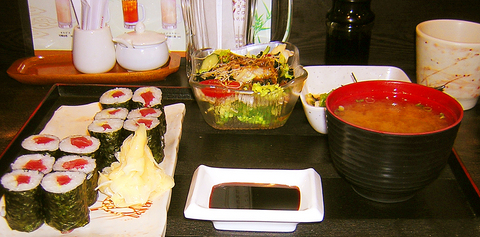Looking to explore Japanese food but don’t think you can settle on just one dish? Plan on eating with friends who have a hard time agreeing on what to order? Want to drink lots of alcohol and enjoy a good meal at the same time? This restaurant solves these dilemmas in one fell swoop.
Yabu Soba serves izakaya ryori (居酒屋料理), or pub-style food. Think of the rathskeller you visit for dinner, except this one serves Japanese dishes and you order a bunch of small but substantial courses to share with a group. There are tables in the back, with bamboo blinds and pictures of sumo wrestlers for decoration. In the evening things get lively and you can still eat at the bar, although this one offers a view of sake bottles and sushi preparation instead of whiskey and beer taps.
On a recent visit a party of seven shared seven delicious dishes and consumed several one-liter bottles of Kirin beer. The result was a satisfying meal and the tab came out at NT$450 per person. Impressively, staff offered to alter the portions of each dish to suit the size of our group.

PHOTO: RON BROWNLOW, TAIPEI TIMES
Memorable courses included the roast potato slices topped with mentaiko, or marinated roe, (NT$160, 烤馬鈴薯明太子), California rolls (NT$160, 加州酪梨捲) and beef tataki (NT$360, 日式生煎牛排), slices of raw steak that have been lightly seared on the outside and are to be dipped in a ponzu sauce. The sauce is what makes this dish. Stir in sliced ginger and scallions thoroughly before dipping the thinly sliced beef.
Staff also recommended the kimchee beef (NT$190, 韓國泡菜牛肉), chicken wings with mentaiko inside (NT$190, 烤雞翅包明太子), and the restaurant’s trademark soba noodles (NT$150, 日式蕎麥冷麵). There’s also a decent selection of vegetable and tofu dishes, such as fried tofu (NT$70, 炸豆腐) and spinach with egg (NT$130, 菠菜蛋); tell staff if you’re a vegetarian before ordering. This being an izakaya, there’s a drinks menu that features around a dozen brightly colored cocktails.
Yabu Soba moved from its old location on Linshen North Road four years ago. It’s now on Nanjing East Road next to the Emperor Hotel and three blocks east of the Zhongshan MRT station.
During lunchtime things are much more subdued and Yabu Soba looks more like a run-of-the-mill Taipei Japanese eatery, albeit one with an extensive and eclectic menu. Lunch prices run from NT$110 for soup noodles to NT$250 or more for a set meal with soup, salad and entree.

As Taiwan’s second most populous city, Taichung looms large in the electoral map. Taiwanese political commentators describe it — along with neighboring Changhua County — as Taiwan’s “swing states” (搖擺州), which is a curious direct borrowing from American election terminology. In the early post-Martial Law era, Taichung was referred to as a “desert of democracy” because while the Democratic Progressive Party (DPP) was winning elections in the north and south, Taichung remained staunchly loyal to the Chinese Nationalist Party (KMT). That changed over time, but in both Changhua and Taichung, the DPP still suffers from a “one-term curse,” with the

Jan. 26 to Feb. 1 Nearly 90 years after it was last recorded, the Basay language was taught in a classroom for the first time in September last year. Over the following three months, students learned its sounds along with the customs and folktales of the Ketagalan people, who once spoke it across northern Taiwan. Although each Ketagalan settlement had its own language, Basay functioned as a common trade language. By the late 19th century, it had largely fallen out of daily use as speakers shifted to Hoklo (commonly known as Taiwanese), surviving only in fragments remembered by the elderly. In

William Liu (劉家君) moved to Kaohsiung from Nantou to live with his boyfriend Reg Hong (洪嘉佑). “In Nantou, people do not support gay rights at all and never even talk about it. Living here made me optimistic and made me realize how much I can express myself,” Liu tells the Taipei Times. Hong and his friend Cony Hsieh (謝昀希) are both active in several LGBT groups and organizations in Kaohsiung. They were among the people behind the city’s 16th Pride event in November last year, which gathered over 35,000 people. Along with others, they clearly see Kaohsiung as the nexus of LGBT rights.

In the American west, “it is said, water flows upwards towards money,” wrote Marc Reisner in one of the most compelling books on public policy ever written, Cadillac Desert. As Americans failed to overcome the West’s water scarcity with hard work and private capital, the Federal government came to the rescue. As Reisner describes: “the American West quietly became the first and most durable example of the modern welfare state.” In Taiwan, the money toward which water flows upwards is the high tech industry, particularly the chip powerhouse Taiwan Semiconductor Manufacturing Co (TSMC, 台積電). Typically articles on TSMC’s water demand